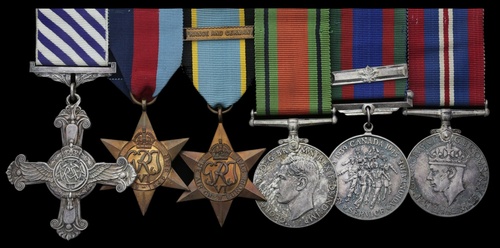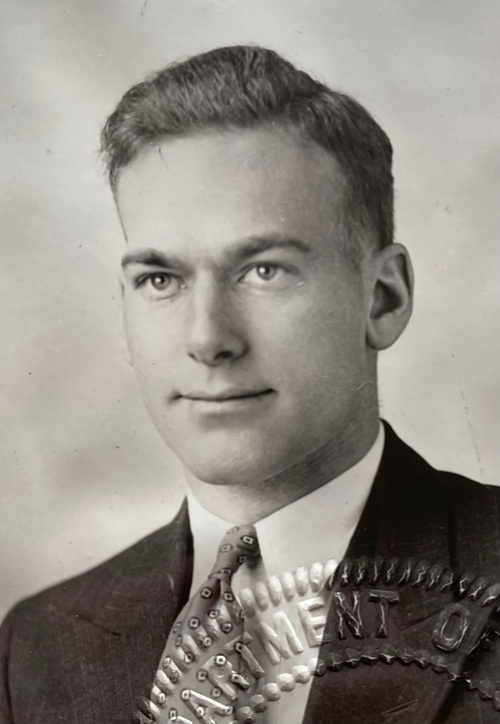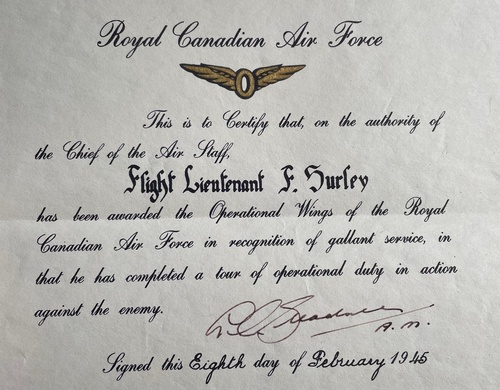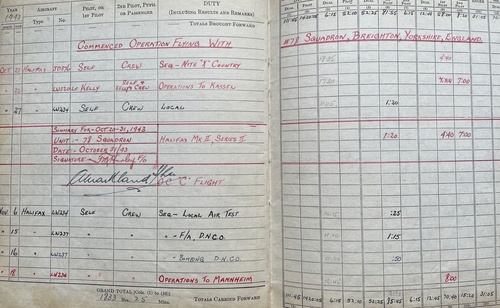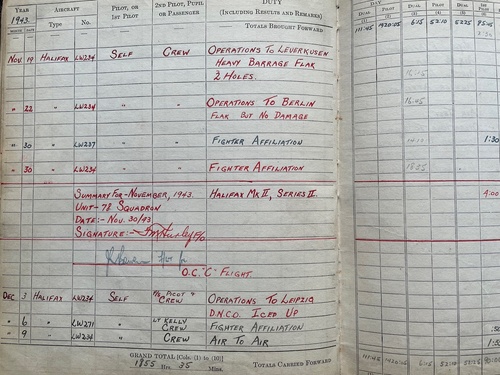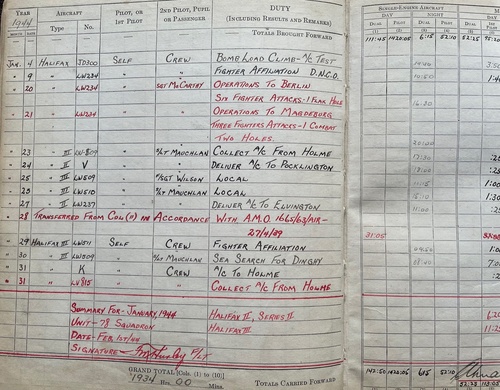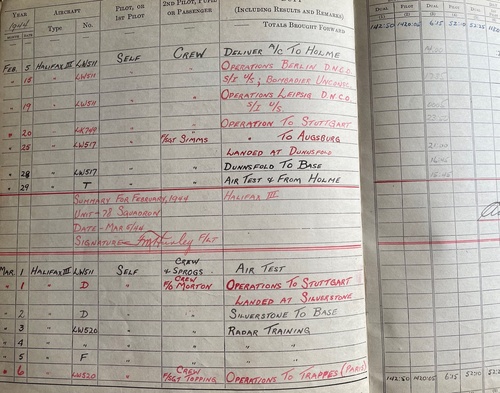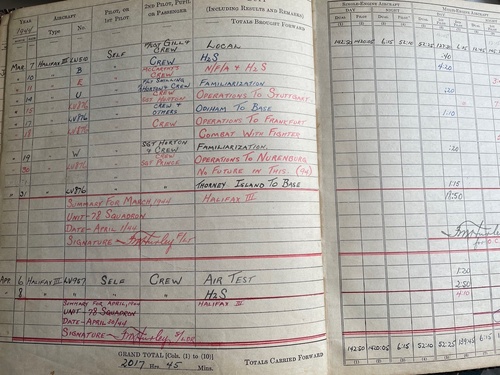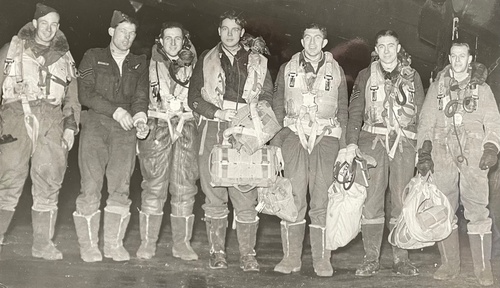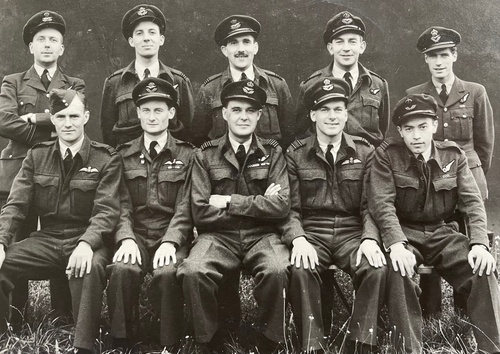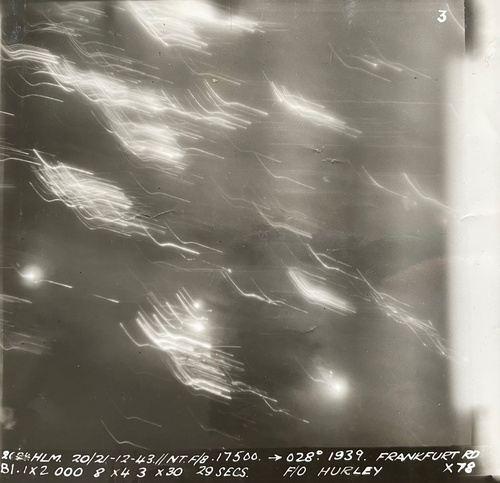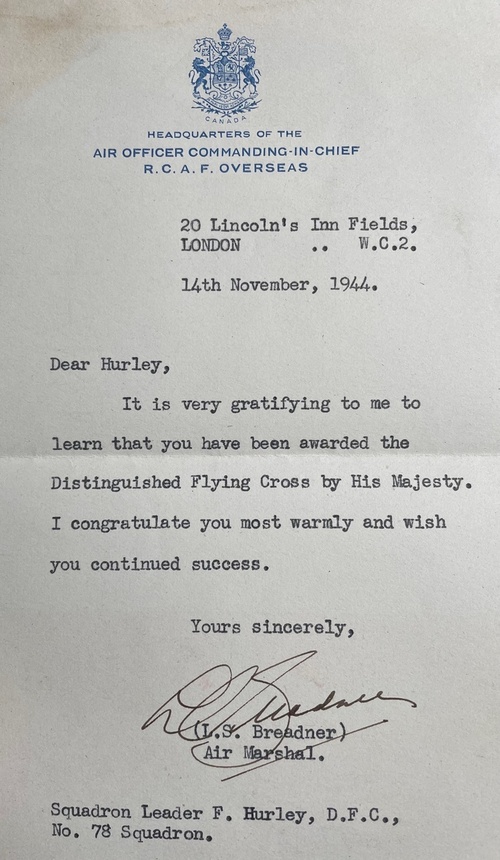Auction: 22002 - Orders, Decorations and Medals
Lot: 234
(x) 'It's getting grim. It was a good prang and the grim part is for them and not us. There were kites all over the place with fighters and bombers and everybody wrestling for position.'
Squadron Leader Hurley on air Ops over Magdeburg.
A well-documented 1944 D.F.C. group of six awarded to Squadron Leader F. Hurley, Royal Canadian Air Force, who was a gallant Flight Commander with No. 78 Squadron
Distinguished Flying Cross, G.VI.R., the reverse officially dated '1944'; 1939-45 Star; Air Crew Europe Star, clasp, France and Germany; Defence Medal 1939-45, Canadian issue in silver; Canadian Volunteer Service Medal, with Overseas clasp; War Medal 1939-45, Canadian issue in silver, good very fine (6)
D.F.C. London Gazette 14 November 1944. The citation states:
'This Officer was a Flight Commander who maintained his flight at a high standard of efficiency. His brilliant leadership and captaincy have set a fine example both to his flight and to the squadron.
He pressed home his attacks with courage and coolness under all hazardous circumstances.
In June, 1944, he led a formation of aircraft in a daylight attack on Noyelle. His aircraft was severely damaged by anti-aircraft fire. Despite great difficulty he continued to the target, dropped his bombs on the aiming point and led the formation back to base.'
Frank Hurley was born on 31 March 1914 at Brandon, Manitoba, son of Mr & Mrs W. M. Hurley of 1124 Grosvenor Avenue, Winnipeg. Upon his joining the Royal Canadian Air Force in 1940, he was an accountant living with his wife at the Hale Haven Store, Road 42, Route 1, Rex, Georgia, United States of America. He had taken his Canadian Private Pilot's Licence (No. 2449) on 26 October 1937.
Serving as a flight instructor until July 1942, he then underwent Pilot training at Fort William, Ontario. Qualifying for his Wings at the end of December 1942, Hurley went to the United Kingdom in February 1943 and reached 20 O.T.U. in June. A short stint at a conversion unit followed until he was assigned to No. 78 Squadron, part of Bomber Command, in October 1943. He joined just in time as the Battle of Germany in the air was beginning.
Flying Halifax bombers out of Breighton, Yorkshire, his Log Book notes his first Op on Kassel on 22 October, being 2nd Pilot to Lieutenant Kelly. Hurley thence took the controls himself for a sortie to Mannheim on 18 November. Further entries give an insight to his experiences:
'19 Nov 1943. Operations to Leuverkusen. Heavy barrage flak. 2 holes.
20 Jan 1944 Operations to Berlin. Six fighter attacks. 1 Flak hole.
21 Jan. Operations to Magdeburg. Three fighter attacks - 1 combat, 2 holes.
30 March. Operations to Nuremburg. No future in this (94) [aircraft lost].'
That final entry provides and interesting commentary of the infamous Nuremburg raid on which Bomber Command lost almost 100 bombers. Hurley was also present on the Op flown by some 598 aircraft during 'Big Week' on Stuttgart on 20 February.
Hurley flew on the sortie to Munster on 12 September and noted 'Intense heavy flak. Real Good Raid. Nice trip.' - he was earning his spurs.
His last Op was on 4 October 1944 to Silverthorne', the code-name for aerial mining in the area of the Kattegat, between Denmark and Sweden, being forced to return on three engines on that occasion. He became a Flight Leader during his tour at No. 78 Squadron, leading one of the Squadron's two flights launched on each raid. He was duly rewarded with his D.F.C. after this sortie; sold together with his Flying Log Book (RCAF Form R.95), bound in brown leather, notebook with some details in ink, his photo album, which also houses a number of official letters, the Certificate for his Wings, newspaper cuttings and the printed citation, besides his two Private Pilot's Licences, Service and Pay Book and cloth insignia.
Subject to 5% tax on Hammer Price in addition to 20% VAT on Buyer’s Premium.
Sold for
£5,200
Starting price
£1700

